what is the prognosis for malignant pleural effusion
Lung cancer in men and breast cancer in women account for 5065 of all MPE 2 followed by ovarian metastatic cancer hematological malignancies and malignant pleural. The presence of malignant tumour cells in the pleural.

Prognostic Impact Of Malignant Pleural Effusion At Presentation In Patients With Metastatic Non Small Cell Lung Cancer Journal Of Thoracic Oncology
They reported mean survival length of 126 days.

. The presence of MPE regardless of the primary site translates into advanced stage disease. Dyspnea is the most common symptom of MPE. A pleural effusion can be serious and potentially life-threatening but it is treatable.
85 Although symptoms can improve after thoracocentesis 98100 of patients with malignant pleural effusion experience reaccumulation of fluid and. The clinical history of patients with malignant pleural effusion MPE can be variable. However most patients with a pleural effusion have no long-term sequelae.
Malignant pleural effusion MPE affects 150000 people in the US and over 250000 people in Europe each year and it represents a common finding up to 15 in the advanced stage cancers 1. The most common associated malignancy in men is lung cancer. In this study we aimed to evaluate the diagnostic and prognostic value of pleural effusion levels.
If cancer grows in the pleural space it causes a malignant pleural effusion This condition is a sign that the cancer has spread or metastasized to other areas of the body. The removal of a large volume of pleural fluid could rapidly expand atelectatic lung regions beyond their capacity to reinflate and cause alveolar capillary injury resulting in re-expansion pulmonary edema. Malignant pleural effusion MPE is a known complication of both thoracic and extra thoracic malignancies.
Development of a malignant pleural effusion is associated with a very poor prognosis with median survival of 4 months and mean survival of less than 1 year. Diagnosis and management of MPE with the goals of palliation and improving quality of life poses a challenge for chest physicians. Patients affected by MPE have a poor prognosis and suffer from breathlessness and impaired quality of life.
The average malignant pleural effusion life expectancy is a little less than six months with the median survival time being as less as four months. Development of a malignant pleural effusion is associated with a very poor prognosis with median survival of 4 months and mean survival of less than 1 year. Malignant pleural effusion MPE is a common and challenging problem.
We take oxygen in through. However other pleural diseases can have a low pleural fluid pH eg malignant effusions rheumatoid and lupus pleurisy urinothorax and saline from a misplaced central venous catheter see Epidemiology clinical presentation and diagnostic evaluation of parapneumonic effusion and empyema in adults section on Differential diagnosis. Interleukin 17 IL-17 is a proinflammatory cytokine produced mainly by CD4 T-lymphocytes and may be important in tumor cell growth and progression.
It is a fairly common complication in a number of different cancers. Oxygen is extremely important when it comes to our survival. Roughly 150000 malignant pleural effusions MPE are diagnosed in the United States each year.
If due to heart failure cirrhosis or malignancy the effusion is likely to recur. The prognosis of cases where the effusion is due to carcinoma of the lung or due to cancer of the. Ad The lungs are constantly inhaling and exhaling in order to provide our body with a steady.
Five studies managed malignant pleural effusions MPEs using chronic indwelling catheters. The prognosis of the patient with a pleural effusion depends on the underlying condition. Prognosis of Malignant Pleural Effusion As previously mentioned this condition often indicates the presence of advanced stage lung cancer or breast cancer.
Studies are contributing evidence on an increasing number of therapeutic options therapeutic thoracentesis thoracoscopic pleurodesis or thoracic drainage indwelling pleural catheter. This can cause you to feel short of breath andor have chest discomfort. The management of MPE has barely changed for many decades.
The majority of cases are caused by lung and breast cancer and since MPE represents advanced disease the prognosis is generally poor. Almost all cancers can potentially produce a pleural effusion. Respiratory symptoms include breathlessness cough and chest pain.
A malignant pleural effusion is when the fluid builds up because of cancer The most common form of cancer that starts in the pleura is mesothelioma a cancer often caused by exposure to asbestos Cancer from anywhere in the body can spread to the pleura but the two commonest cancers to do this are lung cancer and breast cancer. No previous studies however have reported long-term outcomes for patients undergoing diagnostic pleuroscopy in whom no malignancy was demonstrated either with cytologic. Malignant pleural effusion MPE is a common and important clinical condition.
Symptomatic malignant pleural effusion is a common clinical problem. Symptomatic relief was achieved in 942 of patients. This condition is associated with very high mortality with life expectancy ranging from 3 to 12 months.
Patients with pleural effusion and ovarian cancer had the best median survival 21 months compared with those with other primary tumors. Malignant Pleural Effusion A malignant pleural effusion MPE is the build up of fluid and cancer cells that collects between the chest wall and the lung. However recent research has driven new paradigms in the diagno.
A complication in many types of tumors its presence indicates the onset of the terminal stages of cancer. Am J Respir Crit Care Med Vol. In this article we review the pathophysiology epidemiology and pro.
Malignant pleural effusion which is a common clinical problem in patients with cancer may be due to both primary thoracic tumours or to a metastatic spread in the chest and constitutes the first sign of disease in approximately 10 of patients. Malignant effusions may change the staging and subsequent prognosis of the underlying cancer. Mean hospital stay of 233 days complication rates of 165 and mean survival length of 238 163 months were observed.
The most common underlying tumors are lymphomas and cancers of the lung breast and ovaries which account for 75 of cases. The medial survival of patients with breast cancer was 6 months and those with either lung cancer or lymphoma had a median survival of 4 months Tables 3and and44. Patients in these stages often have a poor prognosis with an average life expectancy of less than six months.
Several studies have demonstrated the diagnostic yield of medical thoracoscopy pleuroscopy in making the diagnosis of malignant pleural effusion MPE. Most patients will be symptomatic although up to 25 percent may be asymptomatic with the effusion discovered incidentally during imaging for another reason.

The Diagnostic Steps In Suspected Malignant Pleural Effusion Table 1 Download Scientific Diagram

Treatment Options For Malignant Pleural Effusions Download Table

Survival Of Lung Adenocarcinoma Patients With Malignant Pleural Effusion European Respiratory Society

Prevalence Clinical Characteristics And Outcome Of Pleural Effusions In Ovarian Cancer

Malignant Pleural Effusion Management Keeping The Flood Gates Shut The Lancet Respiratory Medicine

Prognostic Factors For Survival After Surgical Palliation Of Malignant Pleural Effusion Journal Of Thoracic Oncology
Pleural Effusion Macmillan Cancer Support
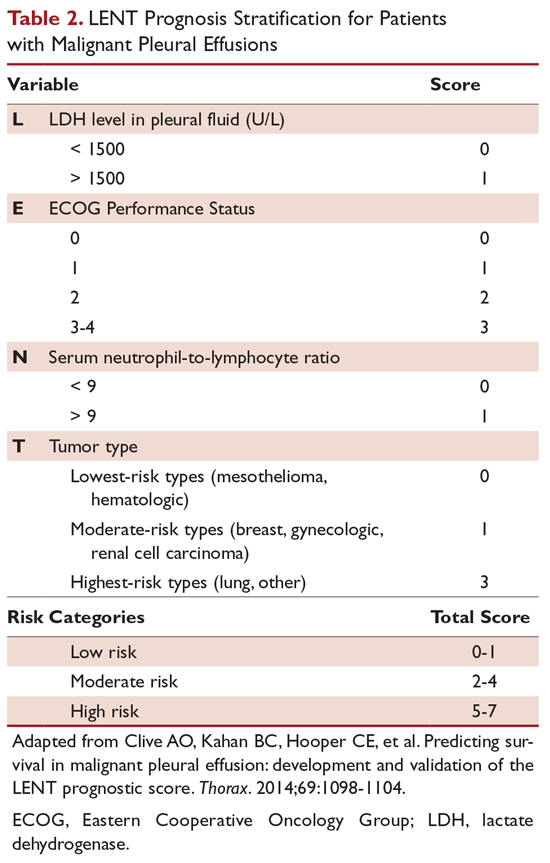
Malignant Pleural Effusion Evaluation And Diagnosis Pulmonary Health Hub
Pleural Effusion Mesothelioma Causes Signs Treatments
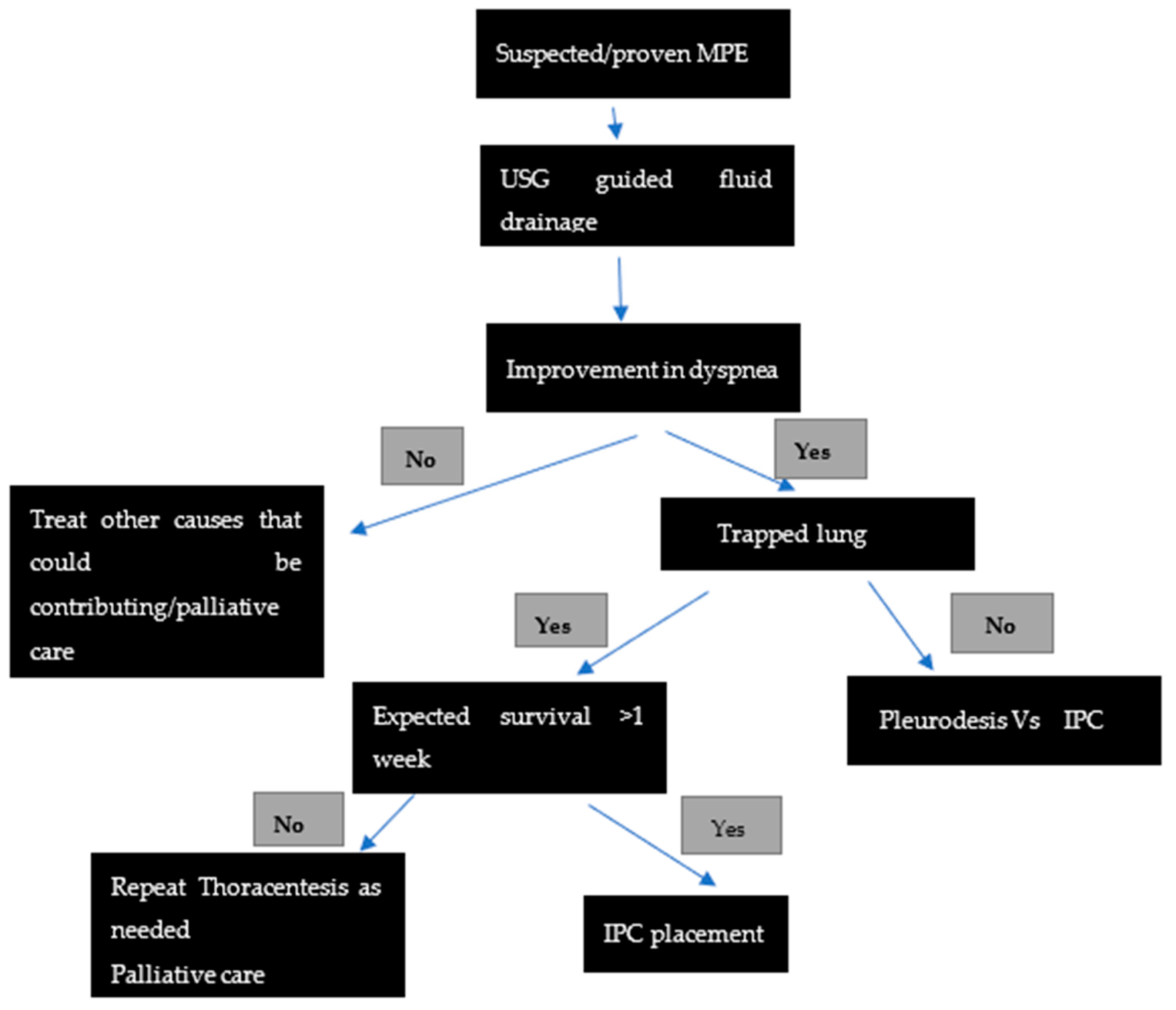
Jcm Free Full Text Malignant Pleural Effusions Mdash A Review Of Current Guidelines And Practices

Prevalence Clinical Characteristics And Outcome Of Pleural Effusions In Ovarian Cancer
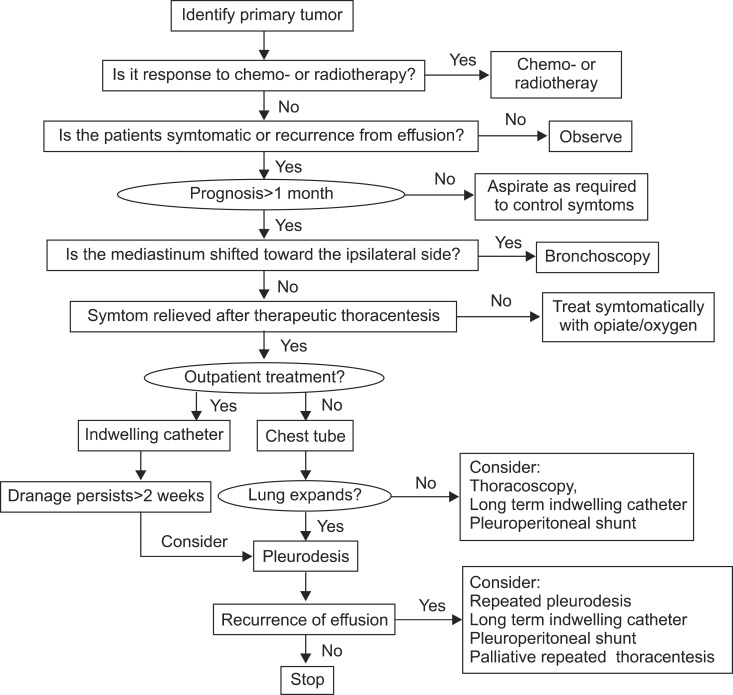
Tuberculosis And Respiratory Diseases
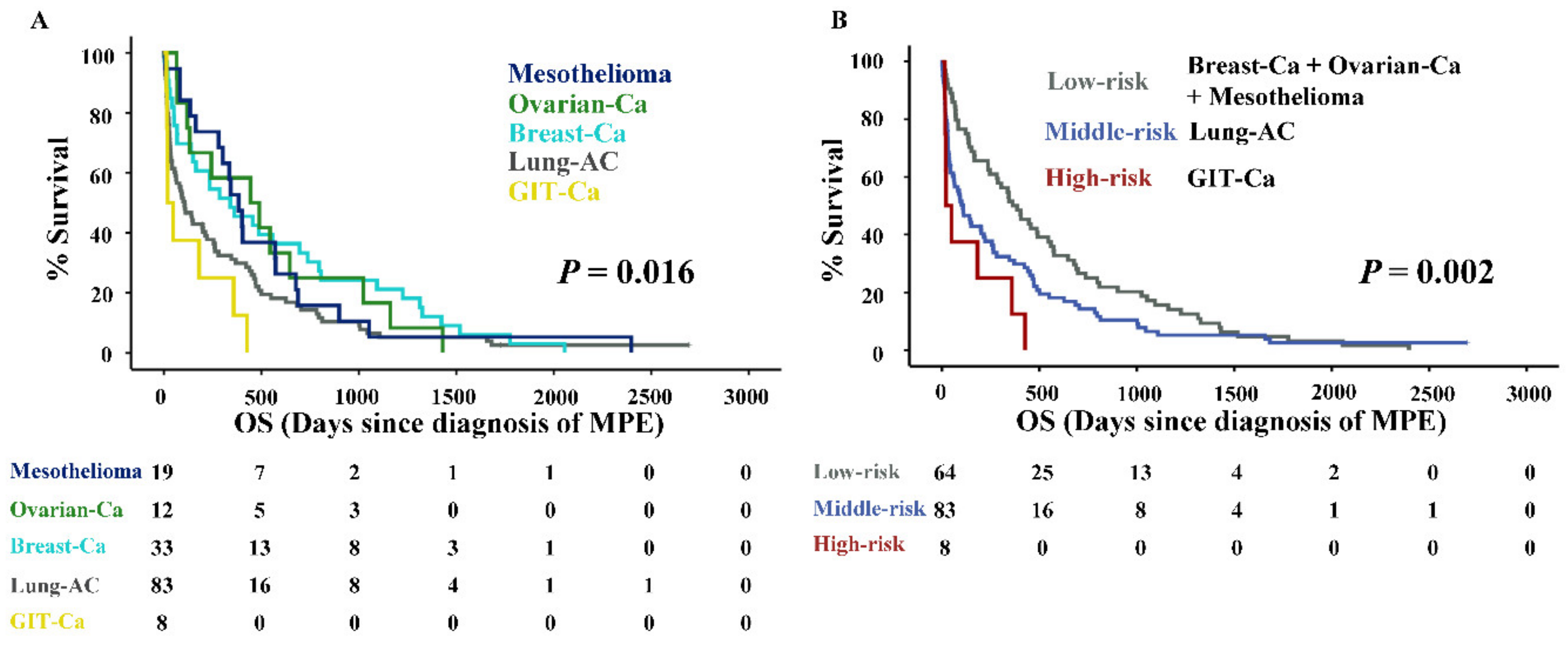
Cancers Free Full Text Prognostic Immune Cell Profiling Of Malignant Pleural Effusion Patients By Computerized Immunohistochemical And Transcriptional Analysis Html

Prognostic Factors For Survival After Surgical Palliation Of Malignant Pleural Effusion Journal Of Thoracic Oncology
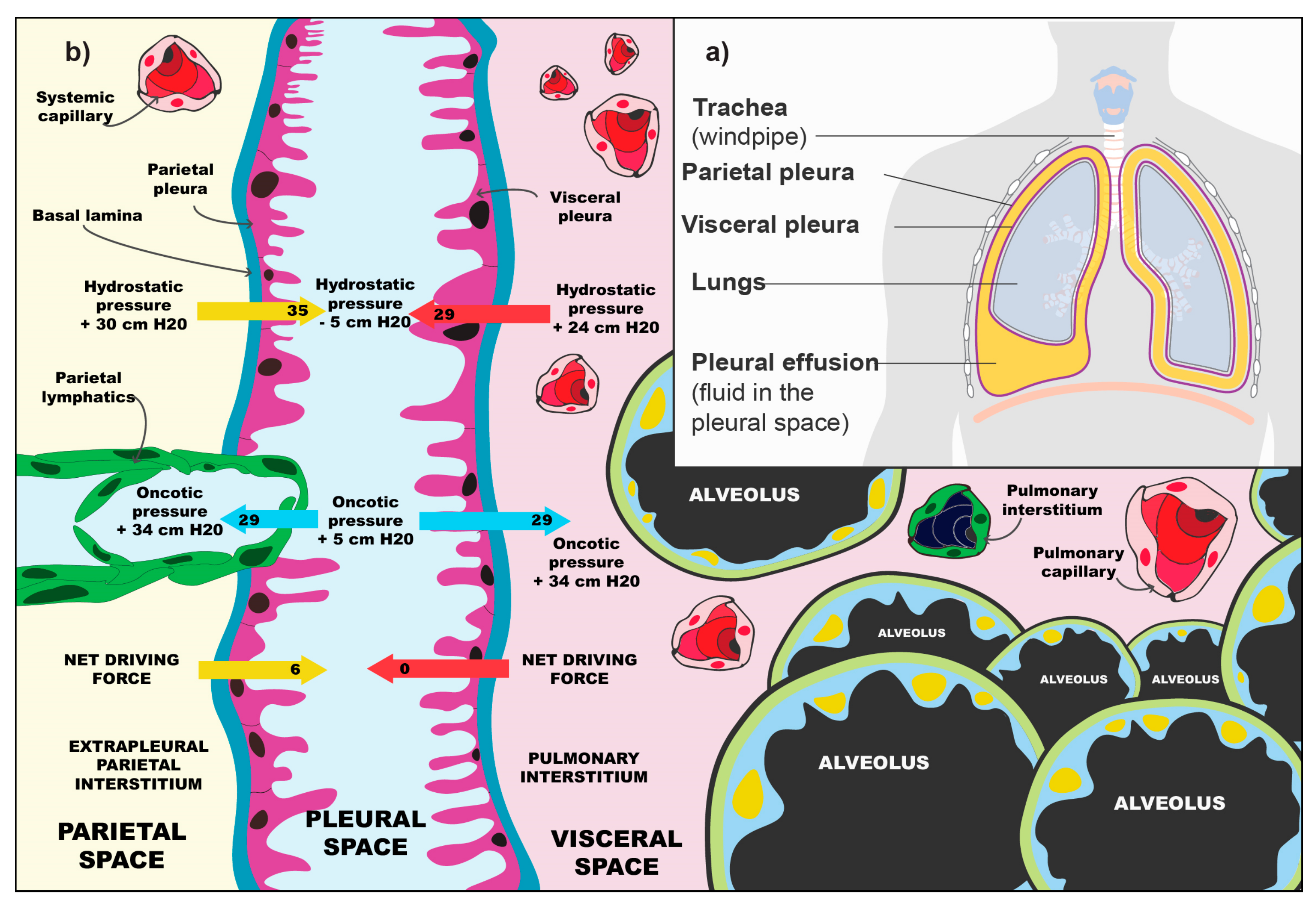
Medicina Free Full Text Malignant Pleural Effusion And Its Current Management A Review Html

Ers Eacts Statement On The Management Of Malignant Pleural Effusions European Respiratory Society

Management Of Malignant Pleural Effusions The Figure Is Modified From Download Scientific Diagram

Overall Survival Probability According To Malignant Pleural Effusion Download Scientific Diagram
Malignant Pleural Effusion Still A Long Way To Go Researcher An